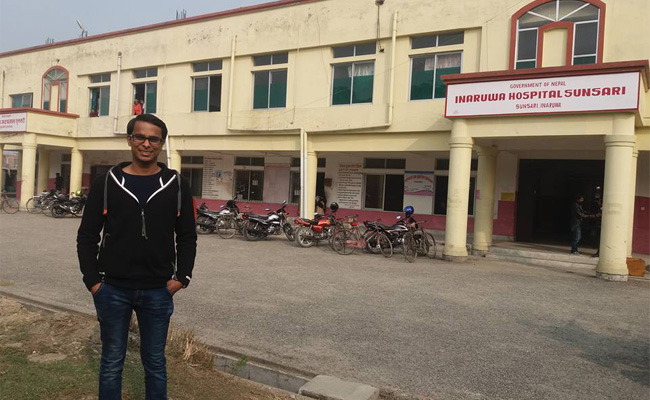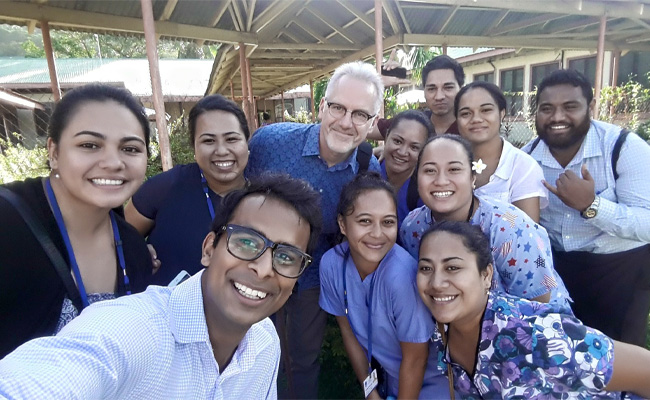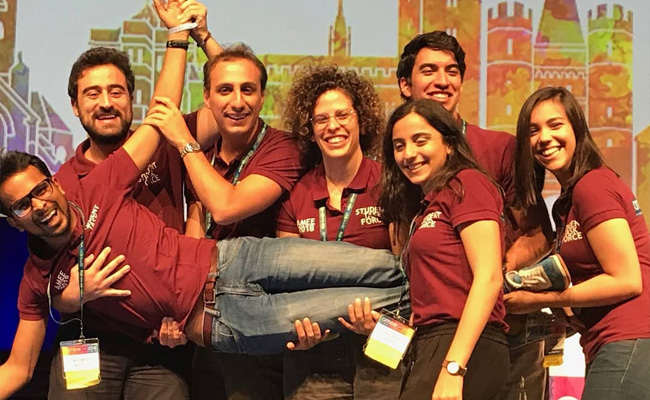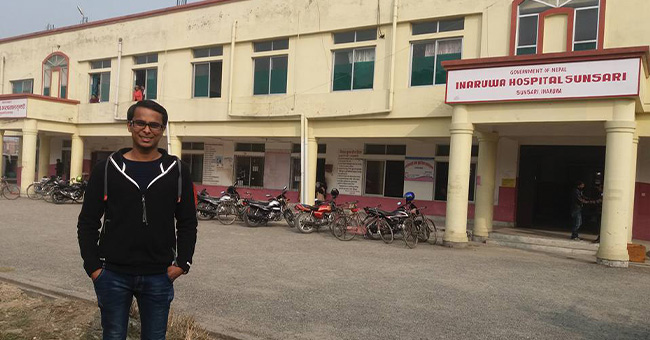@Otago issue 39

Roshit standing in front of Inaruwa Hospital, Sunsari, Nepal, where he was born.
Inspired by a trip to Nepal in 2015, Christchurch medical student Roshit Bothara decided not only did he want to be a paediatrician, he wanted to improve health systems at a community level and support students with new initiatives in medical education.
“I volunteered at the hospital I was born in, a small district hospital,” says Roshit, who moved to New Zealand with his family when he was a child. “It was very eye-opening. Labourers and farmers lined up for hours to see one doctor, it was very basic healthcare. Anyone that was too sick had to go to a tertiary centre, but some couldn’t afford to get there, even though it’s only 60km away.”
Roshit also volunteered at a government primary school and remembers thinking at the time, “I was from there but not from there, I felt like an insider but I was still an outsider. I had these huge idealistic thoughts but really, I had nothing to give.
“I came back to New Zealand and couldn’t forget that. I realised there are thousands of children in my own village that would love to have what I have. My life looks really different, and it was just a harsh reality check.”
Roshit says that’s when his interest in research started, when he began to question “how do we make health systems better, how do I create opportunity for people, especially these children, so they can have equal opportunity?”
During the following years, Roshit combined research with his medical training, and completed his MBChB alongside a BMedSci (Hons). He also graduated with a Postgraduate Diploma in Child Health in 2023, and is now coming to the end of his first year as a paediatric trainee in Christchurch.
As part of his honour’s degree, Roshit researched and implemented the award-winning Global Health Classroom initiative in medical education. This work has helped land him a place on the Master of Public Health at the Bloomberg School, Johns Hopkins University in Baltimore for the 2024-2025 year, where he will be supported by a prestigious Hopkins Sommer Scholarship.
Around 200 students from 80 countries are accepted into the master’s programme each year, with 10 being awarded Sommer Scholarships. The US$110,000 scholarship will cover his course fees and a big chunk of his living costs.
The Sommer programme is described as welcoming students from all backgrounds “who want to make a difference by leveraging their previous professional experiences to drive discovery and shape public health policy of the future”.
Roshit says one of the biggest benefits of the award is that Sommer scholars get an enhanced master’s programme, with extra workshops, leadership training and work opportunities. This year’s cohort has just met with Anthony Fauci, former Director of the National Institute of Allergy and Infectious Disease in the United States.
Roshit’s also looking forward to meeting and working with the other master’s students. “Most of them are doctors, but there will be lawyers, engineers, . . . it will be a very broad group. They will have done some major work already. It will be really nice to be around a lot of people and have a ‘similar language’.”
His focus at Johns Hopkins will be on health policy, which stems from the work he has done during the past few years at Otago.

Roshit Bothara (front left) with Professor David Murdoch (third from left, back row) with Samoan medical students, Samoa, 2017.
As a third-year student, Roshit met Distinguished Professor David Murdoch, who was Head of the Department of Biomedical Science at University of Otago, Christchurch, at the time. As part of Roshit’s honours project for his BMedSci, he developed Professor Murdoch’s idea of video conferencing between students from different countries. This grew into the Global Health Classroom (GHCR), which connects Kiwi medical students with their counterparts in Nepal, Samoa and Fiji. The GHCR is now part of the Year 5 Paediatric Module taught in Christchurch.
The programme has won several international awards, including the Teaching Innovation Award at the Association for Medical Education Europe (AMEE) and Undergraduate Student Award from the Australian New Zealand Health Profession Educators Association (ANZAHPE).
Professor Murdoch says Roshit is “an extraordinary young doctor”.
“It was apparent from when I first met him when he was a medical student that he had a broad global perspective that was unusual in someone of his age, undoubtedly influenced from having lived across different countries and cultures,” he says.
“He is a big picture thinker who always has equity front of mind, and is a natural leader who builds teams and energises colleagues. The award of such a prestigious scholarship from the world’s oldest and largest school of public health is a real credit to Roshit’s focus and qualities. It will provide him with many life-changing opportunities. I am watching his career with great interest and anticipation!”
Roshit says during his study in Christchurch he was surrounded by amazing people, including Professor Murdoch, Professor Tim Wilkinson, Professor Tony Walls, Faumuina Professor Fa’afetai Sopoaga, Associate Professor Philip Pattemore, Dr Malama Tafuna’i, Dr Susan Jack, and Dr Andrew Miller. “I had 10 supervisors in three countries.”
“I remember thinking I’m so lucky. We were able to do some really amazing work and I grew so much. I learnt about global health and medical education and disparity in different places.
“When I met David that first time he said, ‘what do you want from this [honour’s project]?’ I said I’ve got three things and then a big goal. The first thing is I want to learn how to read and write and present because those are three skills I’ll need everywhere. The second is I want to travel, travel, travel. The third thing was I want to work on something tangible that grows. The final thing was I want to do a Master of Public Health at Oxford, Harvard or Johns Hopkins.”
Roshit was selected for student taskforces to attend medical education conferences in Switzerland, Finland and Australia, and says he always came back “just buzzing with ideas”. He also travelled to Samoa to collect data for his research.
“I felt so lucky because I had supervisors who were so supportive and encouraging. When I started my first research project, I had no idea how to write papers or present my research well, and my supervisors invested a huge amount of time and effort to teach me. Going to conferences also requires funding and I am grateful Otago was so supportive with travel grants.”

Roshit (held up by other medical students) at the AMEE Conference, after winning the Teaching Innovation Award.
Subsequently, seven students have presented at European conferences, more funding has been obtained for summer studentships, and Roshit has co-supervised some of the students who have presented their work at conferences.
“I really felt it was important that we had a community and it’s a rolling process of people learning and contributing to the system. It’s been lovely to influence so many people in research. They might give it up for a little while but then hopefully they might come back and continue it. Some students have kept going which is so cool.”
Professor Wilkinson, Acting Dean of the Otago Medical School, says Roshit has a truly global outlook, and also emphasises his collegiality, initiative and energy.
“He’s been very supportive and encouraging to his fellow students to undertake their own research in medical education,” he says. “Plus he’s a really nice guy just to chat to!”
As for the future, Roshit says he doesn’t really know what opportunities may arise from his master’s, but eventually he will come back to New Zealand to finish his paediatric training.
“You can make such a big difference with the things you do, but also you’re surrounded by these incredibly caring and kind people.”
He’s also keen to keep looking at “the bigger picture things”.
“I want to have this Global Health angle because then hopefully I can go to Nepal or I can go to the Pacific Islands or other places and think about the broader system, while being someone who still understands what it feels like to be on the ground.”
Kōrero by Margie Clark, Communications Adviser, Development and Alumni Office










